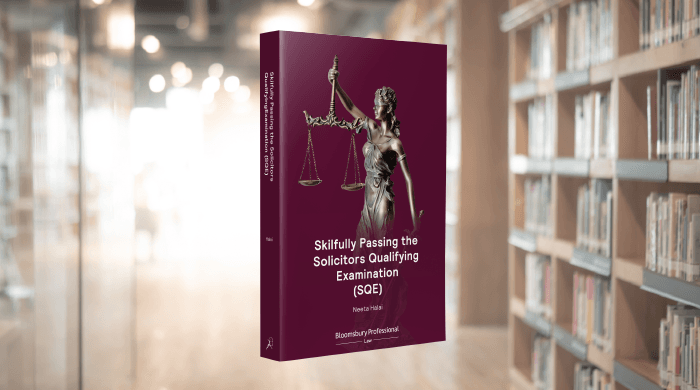Solicitor and legal training expert Neeta Halai answers common questions about the Solicitors Qualifying Exam and shares top tips from her new book, available to pre-order now

The Solicitors Qualifying Exam (SQE) will be the new way to qualify as a solicitor from 1 September 2021. It is a hot topic and can be overwhelming with all the information available and so much flexibility regarding how to study for it.
Neeta Halai of New Heights Training is a qualified solicitor who works with lawyers worldwide, coaching and training them on legal and communication skills.

Below, she answers some common questions about the SQE, points you towards her brilliant new book on this new qualification and how she came about writing it — before it’s even started!
Download chapters from her book here:
• Chapter 5: Communication Skills
• Chapter 12: Legal Writing
The SQE is based on the QLTS
If you are worried about being the first to take part in what feels like a ‘new experiment’, there is no need. The SQE is heavily based on the Qualified Lawyers Transfer Scheme (QLTS) which is the exam foreign jurisdiction lawyers must pass to successfully qualify as a solicitor in England and Wales. So, you can take some comfort from the fact that it is based on a tried and tested format that works.
You can learn from a highly skilled trainer of international lawyers
Halai has coached and trained hundreds of international lawyers, from six of the seven continents, for the QLTS. They range from partners/senior lawyers to juniors from magic circle and smaller law firms, to large organisations with in-house legal departments.
She has already been offering knowledge, insight, practical advice, guidance, tips and tools on many of the common challenges experienced by QLTS lawyers and how to overcome them, and that is how the book, Skilfully Passing the Solicitors Qualifying Examination (SQE) came about.
Halai knows what many QLTS lawyers experience will equally apply to the SQE. So, the aim is the same: to move you from uncertainty and lack of knowledge and skills to a place of certainty, clarity and confidence.
Below are typical questions she has been asked and how she answers them:
“What does the SQE exam include?”
The SQE is classed as one exam but split into two parts:
• SQE Part 1: Functional Legal Knowledge (FLK) Assessments
The focus is on the law tested through 360 multiple choice questions split over two days. You are only assessed on the law.
This part is more straight forward in terms of preparation because you learn the law, understand it and apply it to multiple choice questions; a tangible approach. You learn all the law upfront; so think of it as the substantive (LLB/GDL) and procedural (LPC) subjects all combined.
• SQE Part 2: Practical Legal Skills (PLS) Assessments
The focus is on how you deliver your knowledge of the law in 16 assessments using your oral and written communication skills. You are assessed equally on the law and skills.
This is the practical part where you do not need to learn any ‘new’ law but the focus is on the procedural law subjects (like in the LPC).
From my experience of working with QLTS lawyers many find this equivalent part more challenging than the first because they underestimate the importance of the skills. This is often because skills are intangible so harder to measure without expert help.
Mastering legal and communication skills can take longer than learning the law because this focuses on the quality of what you say and how it is delivered. This means practising and fine-tuning skills that may not come to you naturally can take longer to learn.
For example, in client interviewing (an oral assessment) two of the many skills you have to demonstrate within a legal context are:
• listening and questioning;
• building trust and confidence;
These may seem straight-forward and easy. However, it is these very skills that many experienced QLTS lawyers find challenging. For example, they:
• find it hard to think of questions without making assumptions;
• do not show empathy or lack emotional intelligence when it is required;
• use legal jargon instead of plain English — alienating the client; and
• try to make small talk ‘formally’ so it comes across as unnatural.
There are many common challenges for all the assessments that will equally apply to the SQE.
“So, how hard will the SQE be?”
That really depends on each individual’s perspective. It is designed to be fair and consistent for everyone to meet the standard of a newly qualified solicitor (it is higher than traditional routes to qualification).
With so many different ways to study for the SQE, you need to ensure you choose a way that works best for you and meets the standard required.
“Do I have a better chance of passing SQE2 with legal work experience?”
You can do SQE2 at any time; with or without any legal work experience. However, logically it makes sense to have some good-quality legal work experience which would benefit you from a skills perspective and boost your confidence.
A lot will depend on where you work. Some City firms will want you to complete both parts before starting work and others will prefer you have some work experience. There is no set right or wrong approach.
A key thing to remember is many say the law can be ‘crammed’ for an exam but skills do take time to develop.
Gain more understanding with Neeta Halai’s new book
Halai’s expert understanding above explains why her book is called Skilfully Passing the Solicitors Qualifying Examination (SQE). It is a holistic practical book to complement your law studies. It covers pre-SQE (planning and preparing) to post-SQE (passing and qualifying). There are plenty of examples of how to approach the oral assessments confidently. Also, the sample extracts of different lawyers’ writing styles with constructive feedback and suggested alternatives show you how to approach the written assessments.
10% discount and free P&P
You can purchase Skilfully Passing the Solicitors Qualifying Examination (SQE) through the link in the title name, and claim 10% discount and free P&P when you quote BPLCSQE10 (For eBook formats no code is needed to gain the discount).
Connect with Neeta Halai
Halai looks forward to being a part of your SQE (or QLTS) journey and welcomes you to connect with her through:
LinkedIn Groups: SQE Success | QLTS Success
LinkedIn: Neeta Halai
Twitter: @NeetaHalai
Instagram: @neeta.halai
Facebook: New Heights Training
Website: New Heights Training
About Legal Cheek Careers posts.


